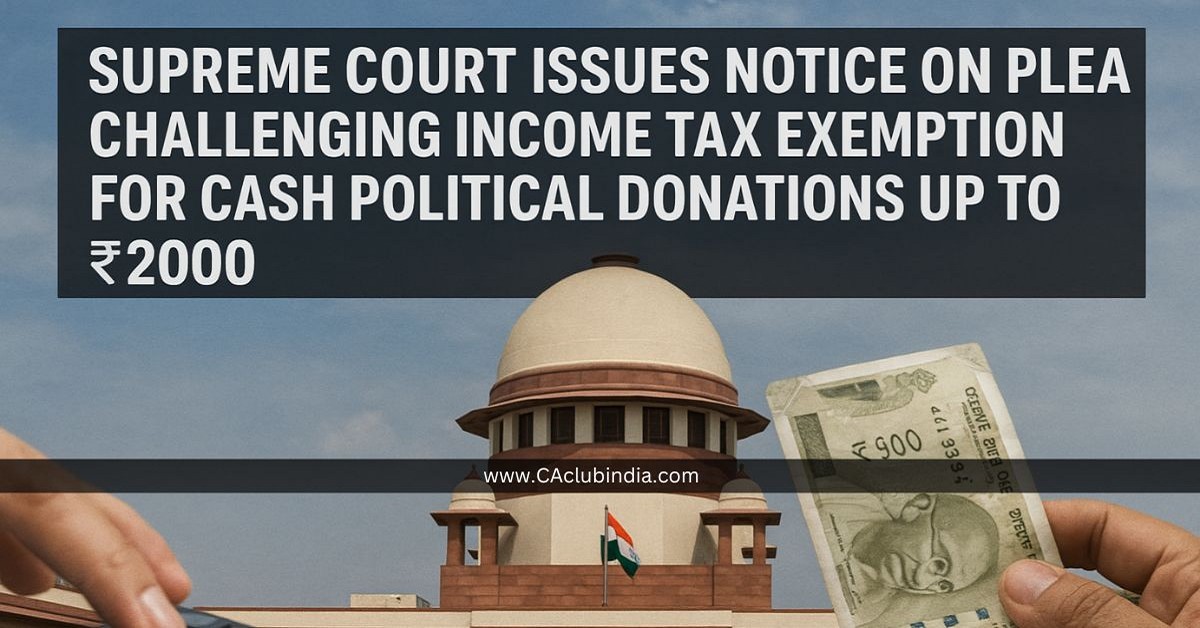The Supreme Court on Monday issued notice on a petition challenging the constitutional validity of Section 13A(d) of the Income Tax Act, which permits political parties to accept cash donations up to Rs 2,000 without disclosing the identity of contributors.
A Bench of Justice Vikram Nath and Justice Sandeep Mehta sought responses from the Election Commission of India (ECI), the Central Board of Direct Taxes (CBDT), and the Ministry of Finance after hearing the plea filed by Dr. Khem Singh Bhati, who alleged that the provision enables opacity in political funding.

Petitioner Flags Transparency Concerns
In the petition, Dr. Bhati argued that the continued allowance of cash donations contradicts the push for digital payments and undermines voters' right to know the sources of political financing.
He highlighted a "huge discrepancy" between contribution reports filed by political parties in Form 24A and the income-tax returns submitted to the tax authorities. According to the plea, several parties have declared "nil contributions" by reporting receipts as cash membership fees, raising doubts about the credibility of disclosures.
Digital Payments Have Matured - No Justification for Cash Donations
The petition emphasizes that widespread digital payment adoption-reflected in UPI transactions exceeding Rs 24 lakh crore in June 2025, negates any rationale for continuing cash-based political donations.
Dr. Bhati argued that even a threshold of Rs 2,000 for anonymous contributions can be misused by splitting large donations into smaller cash payments, allowing parties to bypass scrutiny.
What the Petition Seeks
The petitioner has sought a series of strong directions, including:
- Striking down Section 13A(d) as unconstitutional for enabling non-transparent political funding.
- Mandatory disclosure by all political parties of PAN and bank details for every contribution, including those currently exempt under the cash limit.
- Independent audits of party accounts by auditors appointed by the Election Commission.
- ECI scrutiny of Form 24A submissions and action against parties withholding donor information.
- Withdrawal or suspension of election symbols for non-compliance under the Election Symbols Order, 1968.
- CBDT investigation into political parties' ITRs and audit reports for the past five years, along with initiation of penalties and prosecution wherever necessary.
- A complete prohibition on cash donations, making digital payments compulsory for political financing.
Part of the Larger Push for Clean Political Funding
The challenge comes at a time when political funding in India is under intense judicial review, especially after the Supreme Court's landmark 2024 ruling striking down the Electoral Bonds Scheme for violating the voters' right to information.
The plea argues that anonymous cash donations-even of small amounts-defeat the purpose of transparent electoral financing upheld in the electoral bonds judgment.
What Happens Next
The Supreme Court has now asked the Centre, the Election Commission and the Income Tax Department to file their responses. The matter will be taken up after replies are submitted, putting the spotlight once again on the broader debate around opacity in political funding.








 CAclubindia
CAclubindia

